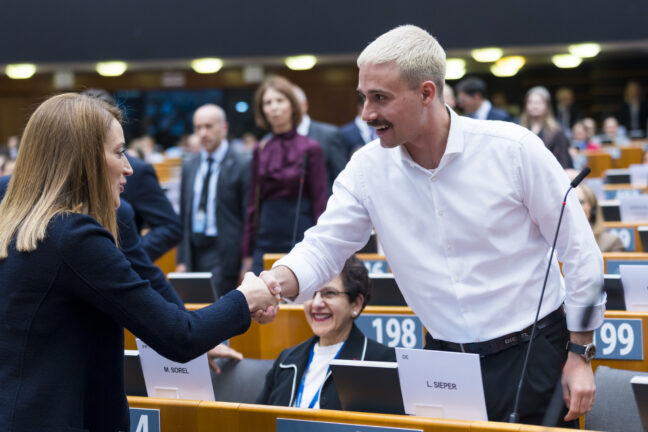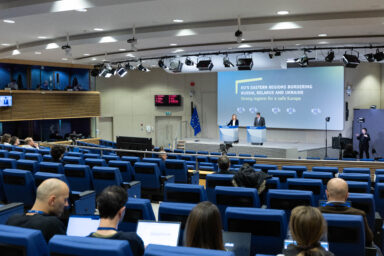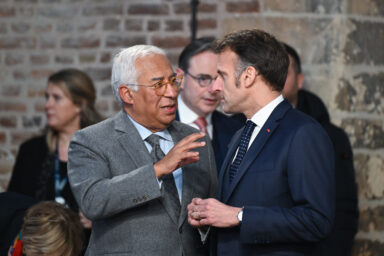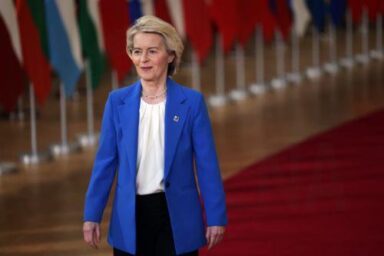People have the kind of government they deserve, Lukas Sieper, German non-attached Member of the European Parliament told EU Perspectives. With that in mind, he harbours hopes for both Hungarian and Georgian public to vote out their countries’ anti-European governments.
After the Euronest discussions on EU enlargement in Yerevan, MEP Lukas Sieper (NI/DEU) urged the EU to overhaul its unanimity rule. Figures like Hungary’s Prime Minister Viktor Orbán are using their veto power to stall Ukraine’s EU bid, Mr Sieper pointed out. He spoke to EU Perspectives about how Hungary’s domestic politics and next year’s elections will heavily shape the future of enlargement.
How could Brussels limit (Hungarian Prime Minister Viktor) Orbán’s veto power over Ukraine’s EU accession path?
First, I hope—and current polling suggests—that Orbán will be voted out next year. That alone would change a lot. Europe should openly support the Hungarian opposition. We must understand that we operate in a Europe-wide political sphere; engaging with political actors across member states is legitimate. Orbán tries to portray such engagement as “malicious foreign interference”, but we are one Union.
We have seen the effectiveness of solidarity, for example during the Pride March in Budapest, where Orbán suffered a major political defeat. Supporting the democratic, pro-European opposition is the simplest way to remove the veto threat. Second, we must abolish the unanimity principle in the Council. A majority in Parliament especially the more progressive side already supports this. Even the Council is experimenting with legal shortcuts that achieve similar effects, suggesting that unanimity is losing credibility.
You might be interested
Third, the Commission needs to show more courage. They have tiptoed around launching treaty-violation procedures against Hungary for years. The withholding of the corona reconstruction funds actually worked, Orbán blocked far more before those billions were frozen. The EU must speak the language of power, because Orbán is an autocrat. Not as extreme as Putin, Xi, or Trump, but an autocrat nonetheless, and such leaders only understand forceful measures.
His government breaks EU rules, not the other way around. Hungary is a country with a strongly pro-European population that freely chose to join the EU. Orbán is obstructing its values. We cannot tolerate that. And if we allow it, Slovakia’s (Prime Minister Robert) Fico, Czech oligarchs, or even (Italy’s Prime Minister Giorgia) Meloni might follow suit. The Commission must firmly remind member states of the limits set by the treaties – limits that they signed up to. Support the democratic, pro-European opposition. Abolish unanimity. Enforce treaty law decisively.
Is removing unanimity a risky move, especially given the rise of the far right in Europe and even in this Parliament?
If we weaken our democratic system out of fear that citizens might listen to populists or extremists, then we have already lost. I believe the majority of Europeans will continue to vote for democracy, and most governments will remain democratic, because our shared interests are stronger.
Yes, abolishing unanimity carries risks. But it is a risk worth taking. That is what democracy is: accepting uncertainty and being unafraid of debate. And that is far better than allowing a single person—most likely influenced by a hostile neighbor—to obstruct the entire process.
What other impressions did you take away from Euronest, as fas as the process of EU enlargement is concerned?
It was a very constructive session, with broad agreement from all sides. We didn’t have the kind of deep conflict lines I experienced, for example, at EuroLat in Peru earlier this year. The major divide there was over how seriously to take climate protection. There, most Latin American representatives were strongly in favor, while a majority of European delegates, unfortunately, were not.
In Armenia, we were all more or less on the same page regarding the major issues. Strengthening cooperation, EU enlargement (one of the core topics for many of us), support for Ukraine in resisting Russia, combating organised crime, countering disinformation, and so on.
However, it must be said that for Belarus and Georgia, only the opposition was present. Belarus, as a dictatorship, would not participate anyway. But in Georgia’s case, the government has unfortunately moved away from the pro-European path, at least for now. Azerbaijan did not come at all, claiming that the European Parliament had treated them unfairly in the past and demanding that this be ‘made up for’. After the Euronest, their government even refused to meet me in Azerbaijan despite having promised to do so before the trip, and they stripped me of my diplomatic protection status. So yes — the people who attended were mostly aligned, but those most likely to disagree simply were not even in the room.
How successful the meeting actually was, and how do you even measure success under such conditions?
I see this as a signal. Strategically, we should try to bring more actors on board. Azerbaijan, I believe, could have been convinced, and had they joined, they likely wouldn’t have been far from the majority positions. For Georgia, I’m less certain, but I strongly support continuing the policy of inviting both government and opposition representatives. This is a parliamentary assembly and parliaments include oppositions, even when some don’t like that.
For the first time, we also had side events organized by NGOs, civil society, and even lobby groups. These included local and international actors, for example, a German business lobby active in the Caucasus. This was valuable. These delegations normally have politicians meeting each other, like in EuroLat, missing the opportunity to engage with civil society.
What negatives would you like to draw attention to?
One thing I didn’t appreciate was that the Armenian participants used the platform as a stage for their internal political disputes. While I understand these issues relate closely to our topics – regional peace, Armenia-Azerbaijan relations, Russia’s influence – this is not the forum to conduct domestic political debates in a back-and-forth manner. It took the focus away from the international dimension, which I found unproductive.
For sure, this is ultimately a matter of political style, not something the delegation can simply ‘fix’. I understand the Armenian position, and no national delegation can claim that its politics would never spill into such a forum. But one lesson from this session is that we should work harder to keep discussions, speeches, and amendments focused on the international dimension of the delegation’s work.
Is it a good move what Commissioner Kos said regarding Georgia being a ‘candidate only in name’? Does it threaten the resilience of the civil society there?
Overall, I think it is a good move. We’ve seen what happens when a candidate country drifts away from the accession path, Türkiye is the clearest example. The country has been a candidate forever, yet in many respects is rolling back democratic standards. Let us not forget that the opposition leader, Ekrem İmamoğlu, was jailed on trumped up charges.
If we don’t clearly communicate, both to the Georgian government and to our own public, that Georgia is not genuinely on the accession path, then we risk repeating the Turkish scenario. Will it change the behavior of Georgian Dream? Maybe, maybe not. But it will change how our citizens perceive the situation, and that matters. Citizens don’t operate in the diplomatic world of carefully chosen words; they want clear and simple messages. The Commission needs to provide precisely that.
Still, does it hurt Georgia’s pro-democracy opposition?
I understand that this may feel discouraging for the Georgian opposition, but ultimately, there’s a saying: every people has the government it deserves. I stand in solidarity with the Georgian opposition and want to support them and I believe the European Parliament is doing that. But Georgians themselves must make the final decision. If the majority truly wants a European future, they must ensure they elect a pro-European government. We know from polls that most Georgians are pro-EU, but we cannot vote for them. They must bring about that change.
I hope Commissioner Kos statement, even if it stings, also strengthens the resolve of the opposition not to give up. They must keep fighting until the government—that, at best, imitates Russian tactics, and at worst, acts as a Russian pawn—is voted out.
And how do you view the development of Türkiye’s status?
Quite simply, there is no real mechanism to terminate the process entirely. From the European side, we would genuinely like Türkiye to become an EU member – not under the current government, perhaps, but as a nation and a people. Economically, strategically, and geographically it makes sense. And it would even resolve the Cyprus issue, since if Türkiye joined the EU, that conflict would be transformed.
Of course, membership would bring challenges: a direct border with Syria, for example. But overall, there is a strong interest. That’s likely why we have neither advanced nor cancelled the accession process. For Erdoğan, I imagine it serves as a bargaining chip: “If you are nice to us, maybe we will come to Europe.” It’s essentially a form of political blackmail.
I think Albania, Montenegro, and North Macedonia—essentially the whole Western Balkans—will be part of the Union. It will have happened by 2030 at the latest. Ukraine is a very special case. We want them in, but they must expel Russian forces from their territory first. Otherwise, we will need a legal solution for the highly unusual situation. Part of the territory of a future EU member is now occupied by a foreign army. Something similar applies to Moldova — I also expect them to join.
Do you think Moldova and Ukraine will join together, or follow separate pathways?
I think they will likely join together. We used to prefer “block accessions,” and mentally it is simpler. But we have diversified our geopolitical approach and no longer think exclusively in such categories. It’s possible that we assess each case individually, but yes – I can easily imagine them joining at the same time. Ultimately, the timing depends on when Putin’s forces are finally pushed back.











